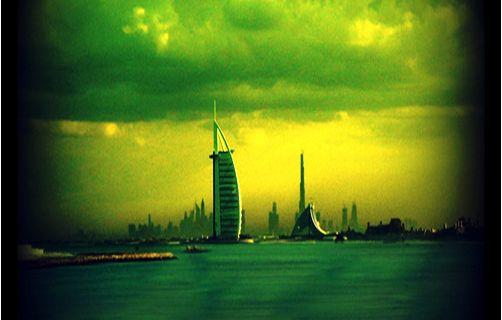Dubai Economy: Dubai Property Prices Fall Through (Their Marble-Hewn) Floor
Please note that we are not authorised to provide any investment advice. The content on this page is for information purposes only.
Dubai Property: View from the Man-Made Palm Islands. Photo credit: Faithful Chant
In those go-go years, Cassandras worried that these gold and marble palaces were built on sand, both literally and in terms of their valuations. They could be, and were, dismissed as small-minded luddites who didn’t understand the new economics of wealth in the 21st century.
With easy money sloshing around the globe and the affluent looking for new exciting playgrounds, Dubai became the latest hot thing, and its property values rose year after year for over a decade.
The symbolic peak – and end – of that era may have been defined by the launch party staged in November 2008 by the Atlantis Hotel, located at the zenith of the man-made Palm Islands. Fittingly, it was the most expensive launch party anywhere, ever. It cost over US$25 million to stage. Kylie Minogue sang (she was paid over $2m to sing a few songs) and a jaw-dropping 1 million fireworks were launched, 10 times as many as at the Beijing Olympics. The display was apparently visible from space.
Although some developers had claimed that the Financial Crisis would not affect Dubai property prices, by that glitzy November night it had become clear that this was a fantasy bigger than the villa that David Beckham reputedly commissioned.
The latest figures show the damage being done. Average Dubai property prices have declined by 40 per cent over the last six months, according to Colliers International. Rental rates have also dropped, by between 20 per cent and 40 per cent. It appears that many end users and occupiers have left, many of them expatriates losing their jobs. Professional investors, picking through the wreckage looking for bargains, are the only active group left. Long gone are the speculators who were flipping properties to occupiers or other speculators for quick profits.
With the amount of developer activity currently underway in Dubai, immediate prospects do not look good. 140,000 new units had been slated for launch by 2010, but many developers have stopped or delayed new projects. Forecasts have been slashed to under 65,000 units by 2011. This may help stabilise the market somewhat. However occupancy levels have dropped from 93 per cent in Q4 2008 to 74 per cent in Q1 2009. Further redundancies, which seem likely, can only push occupancy levels, rentals and therefore property prices in Dubai even further down.
UPDATE: UBS Bank has given one of the bleakest warnings yet about the beleagured Dubai real estate market. They believe that in total prices will drop about 70 per cent from the 2008 high, meaning that we are just over half way through the blood letting. [br]
They forecast that the population of Dubai will decline by 10 per cent as layoffs continue. Remember that over 80 per cent of the population of this emirate is expatriate workers with an icing of playboys. They also project 30 per cent vacancy rates on properties as the norm for the next few years.
Abu Dhabi has been affected, but less so, with property prices down 20 per cent, or half the drop of Dubai. Overall, Colliers predicts that the entire Gulf region will suffer price drops and declining sales.
The most damaging aspect of this crisis for Dubai may not be in the numbers, however. Dubai was once seen as hot, but now for some has come to represent all that was wrong with the ‘bling’ years of 2002 – 2007. If that mentality holds after the recession lifts, then Dubai will be in need of a major image makeover. Hosni Afleck, EconomyWatch.com.





